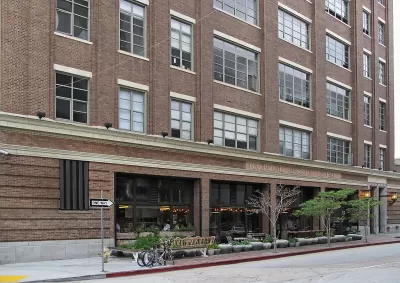Pre-pandemic housing crisis, meet the post-pandemic office vacancy crisis.

The opportunity for adaptive reuse to overhaul downtowns and commercial corridors for a post-pandemic future by converting vacant office and commercial uses to sorely needed housing is well documented—and communities have taken notice. From Chattanooga to San Francisco to D.C. to San Antonio to Maine to Philadelphia and Pittsburgh, adaptive reuse is more popular than ever.
But, experts warn, it won’t be that easy to convert every vacant office building into housing. A paywalled article by Michelle Chang for Quartz is the latest to explain why adaptive reuse isn’t a mutually beneficial silver bullet for the post-pandemic recovery and the pre-and-post-pandemic housing affordable crisis.
Despite picking up the adaptive reuse pace considerably, the net result still isn’t much compared to the scale of the problem. “So while the number of office-to-apartment conversions in the US is expected to more than double, from 11 this year to 34 in 2023, according to CBRE, that’s a tiny portion of the overall office market, which includes both large office towers and smaller developments. The 89 total housing conversions Morin’s company has identified since 2016 amount to fewer than 15,000 units,” writes Chang.
As it tuns out, office-to-residential conversions are quite expensive, which makes these projects cost prohibitive in many cases and also ensures that completed projects are only available at the high of the market—where there is considerably less demand than at lower ends of the market.
“Then there’s just the very act of turning large office floors into multiple livable spaces. Each apartment unit needs windows and light (not to mention plumbing) to turn these buildings into desirable places to live, forcing developers to gut the inside of massive office buildings,” writes Chang.
Chang also notes that so far government incentives for adaptive reuse are helping build momentum for the cause. “For example, office-to-residential projects are moving ahead in so-called opportunity zones, where investors can receive tax benefits. In some places, other tax credits, such as historical preservation tax credits or national tax credits, also help developers profitably turn offices into apartments.” More incentives that similarly lower the price of these conversions could continue to build on the momentum of early efforts, according to the article.
FULL STORY: Why it’s so hard to convert offices into housing

Alabama: Trump Terminates Settlements for Black Communities Harmed By Raw Sewage
Trump deemed the landmark civil rights agreement “illegal DEI and environmental justice policy.”

Study: Maui’s Plan to Convert Vacation Rentals to Long-Term Housing Could Cause Nearly $1 Billion Economic Loss
The plan would reduce visitor accommodation by 25% resulting in 1,900 jobs lost.

Planetizen Federal Action Tracker
A weekly monitor of how Trump’s orders and actions are impacting planners and planning in America.

Wind Energy on the Rise Despite Federal Policy Reversal
The Trump administration is revoking federal support for renewable energy, but demand for new projects continues unabated.

Passengers Flock to Caltrain After Electrification
The new electric trains are running faster and more reliably, leading to strong ridership growth on the Bay Area rail system.

Texas Churches Rally Behind ‘Yes in God’s Back Yard’ Legislation
Religious leaders want the state to reduce zoning regulations to streamline leasing church-owned land to housing developers.
Urban Design for Planners 1: Software Tools
This six-course series explores essential urban design concepts using open source software and equips planners with the tools they need to participate fully in the urban design process.
Planning for Universal Design
Learn the tools for implementing Universal Design in planning regulations.
Caltrans
Smith Gee Studio
Institute for Housing and Urban Development Studies (IHS)
City of Grandview
Harvard GSD Executive Education
Toledo-Lucas County Plan Commissions
Salt Lake City
NYU Wagner Graduate School of Public Service





























